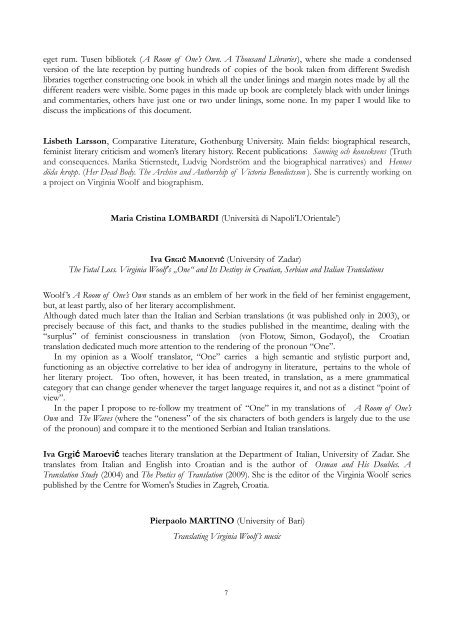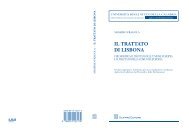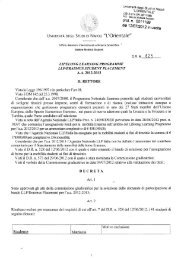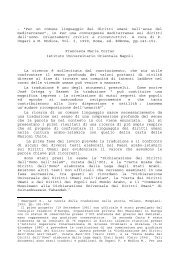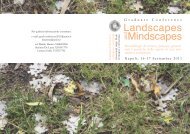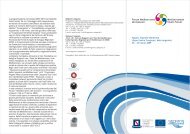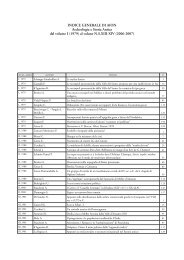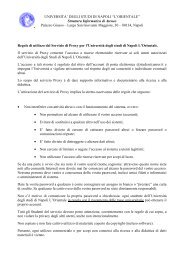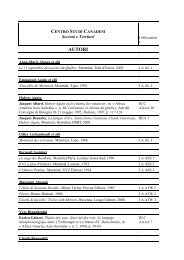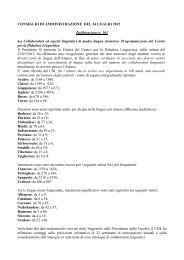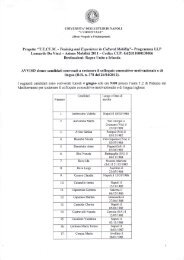Alessia Oppizzi - Università degli studi di Napoli L'Orientale
Alessia Oppizzi - Università degli studi di Napoli L'Orientale
Alessia Oppizzi - Università degli studi di Napoli L'Orientale
You also want an ePaper? Increase the reach of your titles
YUMPU automatically turns print PDFs into web optimized ePapers that Google loves.
eget rum. Tusen bibliotek (A Room of One’s Own. A Thousand Libraries), where she made a condensed<br />
version of the late reception by putting hundreds of copies of the book taken from <strong>di</strong>fferent Swe<strong>di</strong>sh<br />
libraries together constructing one book in which all the under linings and margin notes made by all the<br />
<strong>di</strong>fferent readers were visible. Some pages in this made up book are completely black with under linings<br />
and commentaries, others have just one or two under linings, some none. In my paper I would like to<br />
<strong>di</strong>scuss the implications of this document.<br />
Lisbeth Larsson, Comparative Literature, Gothenburg University. Main fields: biographical research,<br />
feminist literary criticism and women’s literary history. Recent publications: Sanning och konsekvens (Truth<br />
and consequences. Marika Stiernstedt, Ludvig Nordström and the biographical narratives) and Hennes<br />
döda kropp. (Her Dead Body. The Archive and Authorship of Victoria Bene<strong>di</strong>ctsson ). She is currently working on<br />
a project on Virginia Woolf and biographism.<br />
Maria Cristina LOMBARDI (Università <strong>di</strong> <strong>Napoli</strong>’L’Orientale’)<br />
Iva GRGIĆ MAROEVIĆ (University of Zadar)<br />
The Fatal Loss. Virginia Woolf's „One“ and Its Destiny in Croatian, Serbian and Italian Translations<br />
Woolf ’s A Room of One’s Own stands as an emblem of her work in the field of her feminist engagement,<br />
but, at least partly, also of her literary accomplishment.<br />
Although dated much later than the Italian and Serbian translations (it was published only in 2003), or<br />
precisely because of this fact, and thanks to the <strong>stu<strong>di</strong></strong>es published in the meantime, dealing with the<br />
“surplus” of feminist consciousness in translation (von Flotow, Simon, Godayol), the Croatian<br />
translation de<strong>di</strong>cated much more attention to the rendering of the pronoun “One”.<br />
In my opinion as a Woolf translator, “One” carries a high semantic and stylistic purport and,<br />
functioning as an objective correlative to her idea of androgyny in literature, pertains to the whole of<br />
her literary project. Too often, however, it has been treated, in translation, as a mere grammatical<br />
category that can change gender whenever the target language requires it, and not as a <strong>di</strong>stinct “point of<br />
view”.<br />
In the paper I propose to re-follow my treatment of “One” in my translations of A Room of One’s<br />
Own and The Waves (where the “oneness” of the six characters of both genders is largely due to the use<br />
of the pronoun) and compare it to the mentioned Serbian and Italian translations.<br />
Iva Grgi ć Maroević teaches literary translation at the Department of Italian, University of Zadar. She<br />
translates from Italian and English into Croatian and is the author of Osman and His Doubles. A<br />
Translation Study (2004) and The Poetics of Translation (2009). She is the e<strong>di</strong>tor of the Virginia Woolf series<br />
published by the Centre for Women's Stu<strong>di</strong>es in Zagreb, Croatia.<br />
Pierpaolo MARTINO (University of Bari)<br />
Translating Virginia Woolf’s music<br />
7


